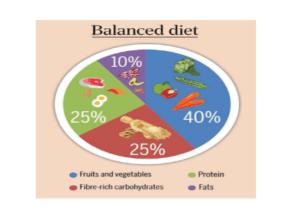Share this blog post with your friends
Nutritional health involves knowing the role of various nutrients, such as carbohydrates, proteins, fats, vitamins, and minerals, in promoting good health.
It offers a lot of benefits for the overall well-being of a person and the overall well-being of an individual depends on a balanced diet. A diet that contains the necessary nutrients. A diet that can strengthen the energy level of a person.
A balanced diet can strengthen the immune system and fight off diseases. A balanced diet can also reduce the rate of getting obese.
Going forward in this article we will be looking at assessing nutritional needs, macronutrients and micronutrients and the role they play, nutrition and chronic diseases, and nutritional strategies for optimal health.

Source: Femina
ASSESSING NUTRITIONAL NEEDS
Assessing nutritional needs involves assessing the overall health status of an individual which can be done through medical/biochemical tests, and dietary methods.
The following are taken into consideration during the assessment;
- Age.
- Gender.
- Height.
- Body weight.
- Heart rate
- Blood pressure. e.t.c
Assessing these needs can be done through the following methods:
- Clinical method.
- Dietary methods
- Biochemical method.
- Anthropometric method.
MACRONUTRIENTS AND THEIR ROLES
Macronutrients are nutrients required by the body in large quantities. They include Carbohydrates, Proteins, and Fats.
Carbohydrates
These are energy-giving foods. They are present in grains such as Rice, Cereals, Pasta e.t.c They are also present in fruits such as Apple, Mango, and Oranges.
Carbohydrates can also be classified into simple and complex sugars. Simple sugar consists of Monosaccharides( Glucose, Fructose, and Galactose) and Disaccharides( Maltose, Lactose, and Sucrose) while complex sugar consists of polysaccharides. ( Starch and Fibers)

Source: Star Health Insurance
Proteins
These are complex molecules needed by the body to function well. They are needed to repair worn-out tissues in the body and they aid the growth of an individual. Their sources include Eggs, Meats, Legumes, Fish, e.t.c
Fats
It is a macronutrient that serves as a concentrated form of energy in the body. It is derived from fatty acids. It gives the body energy, serves as insulation to the body, and helps in regulating the body’s hormones. They can be found in foods such as butter, oils, seeds e.t.c
Eating foods that have a combination of these macronutrients will help to maintain the overall well-being of an individual.
MICRONUTRIENTS AND THEIR ROLES
Micronutrients are nutrients required by the body in minute (small) quantities. They include Fat and water-soluble Vitamins and other minerals.
Vitamin A: This is a fat-soluble vitamin that is essential for normal vision, growth and development, reproduction e.t.c
Vitamin D: This is also a fat-soluble vitamin that helps the body retain calcium which helps in bone development.

Source: www.bhf.org.uk
Vitamin K: This is a fat-soluble vitamin that helps in blood clotting.
Vitamin E: This helps to fight against diseases by keeping the immune system healthy.
Vitamin C: It is water-soluble. It is required for growth and development. This also helps to strengthen the immune system.
Vitamin B: There are different types of B vitamins which include, Vitamin B1, B2, B3, B5, B6, B7, B9, and B12. They help in red blood cell formation and also help to convert food into energy.

Sources: My Concierge MD
Other minerals include:
Iron: This is needed for growth and development. It helps in the transportation of oxygen throughout the body. A deficiency in Iron can lead to Anaemia, dizziness, pale skin, headache e.t.c
Zinc: It plays an important role in the body which includes DNA synthesis, and cell division. e.t.c A deficiency in Zinc Mineral can lead to retarded growth, delayed healing of wounds, and hair loss. e.t.c
Magnesium: Magnesium is an essential mineral needed by the body to carry out functions such as bone development, protein synthesis, and blood sugar regulation. A deficiency in magnesium can lead to muscle cramps, fatigue, loss of appetite e.t.c
Calcium: Calcium is an essential mineral that is necessary for building and maintaining strong bones and teeth. It also helps in blood clotting. Calcium deficiency can lead to weak bones, fractures, and other bone issues.
Iodine: It is an essential mineral that helps in regulating the growth and development of an individual. It also aids metabolic processes. Iodine deficiency can lead to w, weight gain, dry skin, and even hair loss.
These micronutrients are also necessary and needed by the body for the overall well-being of an individual.
NUTRITION AND CHRONIC DISEASES
Nutrition plays an important role when it comes to dealing with chronic diseases. Having a proper diet can improve the nutritional health of an individual.
Poor dietary habits such as eating processed foods, and consuming excessive sugar and salt should be avoided as they increase the risk of chronic diseases.
Adopting and sticking to a nutritious and balanced diet can help reduce the risk of chronic diseases. So, It’s important to consult health care professionals and dieticians for a proper meal plan that can improve one’s well-being.
NUTRITIONAL STRATEGIES FOR OPTIMAL HEALTH.
Below are some nutritional strategies you can implement for optimal health.
- Plan and prepare your meals ahead of time.
- Practice mindful eating.
- Consult a dietitian or health professional.
- Limit the intake of sugar.
- Eat whole food and try to cut down on processed foods.
- Eat a balanced diet.
- Stay hydrated by drinking water.
- Watch your food portions to avoid overeating.
- Eat vegetables and fruits.
- Stick to meal timing.

Source: Harvard Health
NUTRITIONAL GUIDELINES AND RECOMMENDATIONS
There are different national guidelines and recommendations from different health organizations.
The World Health Organization (WHO) stated some key facts which include,
- A healthy diet helps to protect against malnutrition in all its forms, as well as non-communicable diseases (NCDs), including diabetes, heart disease, stroke, and cancer.
- An unhealthy diet and lack of physical activity are leading global risks to health.
- Limiting intake of free sugars to less than 10% of total energy intake (2, 7) is part of a healthy diet. A further reduction to less than 5% of total energy intake is suggested for additional health benefits
- Keeping salt intake to less than 5g per day (equivalent to sodium intake of less than 2g per day) helps to prevent hypertension, and reduces the risk of heart disease and stroke in the adult population
In conclusion:
Adopting a healthy lifestyle is very necessary for the overall well-being of an individual. It is vital to take one’s nutritional health seriously, as it reduces the risk of falling sick, strengthens the immune system which helps to fight against diseases, and also aids in recovering faster from illness.

